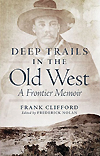
Deep Trails in the Old West: A Frontier Memoir, by Frank Clifford, edited by Frederick Nolan, University of Oklahoma Press, Norman, 2011, $29.95
Born near the Welsh mining town of Pontypool on March 18, 1860, John Menham Wightman was 11 when his father moved to Cimarron, New Mexico Territory, to work for the Maxwell Land Grant and Railroad Co. His father died three years later, and from then on, Wightman recalled, he usually worked on ranches, “in general, having a good time. Clay Allison was a good friend of mine, and I rode with him in some of the stirring incidents of the Colfax County ‘war.’”
And that was just the teenage beginning of a rambling cowboy’s life that was accompanied by concurrent changes of name to go with the changes of career and venue, from John to Frank Wightman, Frank Clifford and, finally, John Francis Wallace, the name on his tombstone when he finally died on September 8, 1946. In an Old West marked by the perpetual possibility of reinventing oneself, Wightman’s name changes seem to go with the territory. After all, he personally knew a certain Henry McCarthy, also variously known as William Bonney, Kid Antrim, Billy the Kid or just the Kid.
The memoirs of this witness to Southwestern history, transcribed by painter Genevieve Frickel after a chance encounter aboard a train in 1940, were never published. For reasons that remain unclear, Clifford, as he called himself in Frickel’s presence, did not want his own family to know about his “roughneck” past. However, their discovery and release by his grandson to historian Frederick Nolan more than 50 years later make Deep Trails in the Old West an intriguing addition to the autobiographical literature already extant from many of the people Clifford knew.
Frank Clifford was a peripheral player in some of the more dramatic events of old New Mexico—he describes how as a youth he turned a few lucky shots into a fearsome reputation, while later stating proudly that he never killed a man in his life—but his very juxtaposition on the sidelines makes his candid descriptions of the times, places and customs he knew all the more edifying. Thanks to his fluency in Spanish and his rapport with Hispanic Americans (which the Kid also had), Clifford describes their lives as easily as he does those of the Anglos.
—Jon Guttman




